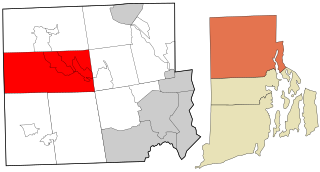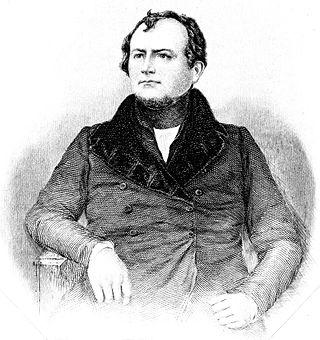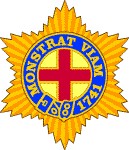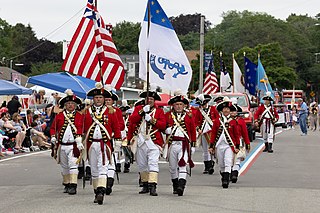
Glocester is a town in Providence County, Rhode Island, United States. The population was 9,974 as of the 2020 census. The villages of Chepachet and Harmony are in Glocester. Putnam Pike runs west through the town center of Glocester into Putnam, Connecticut.

The Dorr Rebellion (1841–1842) was an attempt by disenfranchised residents to force broader democracy in the U.S. state of Rhode Island, where a small rural elite was in control of government. It was led by Thomas Wilson Dorr, who mobilized the disenfranchised to demand changes to the state's electoral rules. The state was still using its 1663 colonial charter as a constitution; it required that voters own land as qualification to vote. The rebellion established a parallel government alongside the existing chartered government and wrote a new constitution for Rhode Island. Although the rebellion was crushed militarily, it forced the rewriting of the state constitution to expand eligibility to vote.

Thomas Wilson Dorr, was an American politician and reformer in Rhode Island, best known for leading the Dorr Rebellion.
Joseph Stanton Jr. was a military officer, a United States senator of the Anti-Federalist faction and a United States Representative of the Democratic-Republican party.

Henry Jonah Steere (1830–1889) was a prominent American philanthropist and industrialist from Rhode Island.

The 1st Rhode Island Infantry Regiment were two regiments of the United States Army, the first of which was raised in 1861 at the beginning of the American Civil War on a 90-day enlistment, the second during the Spanish–American War in 1898.

The Newport Artillery Company of Newport, Rhode Island was chartered in 1741 by the Rhode Island General Assembly during the reign of King George II of Great Britain. It is the oldest military unit in the United States operating under its original charter, and the company maintains a museum in its historic armory. The company has served in wars ranging from the French and Indian War to the First World War. Individual members of the Company have served in every war fought by the United States.

Associators were members of 17th- and 18th-century volunteer military associations in the British American thirteen colonies and British Colony of Canada. These were more commonly known as Maryland Protestant, Pennsylvania, and American Patriot and British Loyalist colonial militias. But unlike militias, the associator military volunteers were exempt from regular mandatory military service. Other names used to describe associators were "Associations", "Associated", "Refugees", "Volunteers", and "Partisans".

The Rhode Island Army National Guard (RIARNG) is the land force militia for the U.S. state of Rhode Island. It operates under Title 10 and Title 32 of the United States Code and operates under the command of the state governor while not in federal service. National Guard units may function under arms in a state status, therefore they may be called up for active duty by the governor to help respond to domestic emergencies and disasters, such as those caused by hurricanes, floods, or civil unrest.

The First Corps of Cadets of Massachusetts formed in 1741. Its motto is Monstrat Viam - "It Points the Way." While it has served in several wars, the sub-unit's primary contribution to Massachusetts and to the United States was as an officer-producing institution for new regiments from the Revolutionary War through World War II.

The 175th Infantry Regiment is an infantry regiment of the Maryland Army National Guard. It is one of several National Guard units with colonial roots and campaign credit for the War of 1812.

Chepachet is a village and census-designated place (CDP) in the town of Glocester in the northwestern part of the U.S. state of Rhode Island. It is centered at the intersection of U.S. Route 44 and Rhode Island Route 102. Chepachet's ZIP code is 02814. As of the 2010 census, the CDP had a population of 1,675.
Twenty-four current units of the Army National Guard perpetuate the lineages of militia units mustered into federal service during the War of 1812. Militia units from nine states that were part of the Union by the end of the War of 1812, plus the District of Columbia, are the predecessors of eighteen units that currently exist in the Army National Guard. Two of the four units derived from Virginia militias are in the West Virginia National Guard; at the time of the War of 1812, West Virginia was still part of Virginia. Only two current units, the 155th Infantry, a component of the Mississippi National Guard derived from militia units organized in the Mississippi Territory and the 130th Infantry, a component of the Illinois National Guard derived from militia units formed in the Illinois Territory, are from states or territories west of the Appalachians. Unfortunately, no militia units from the states of Kentucky, Louisiana, Ohio or Tennessee, or from the Indiana, Michigan, Missouri or Louisiana Territories, where militia units played a major role in the fighting, have survived as units in the modern Army National Guard.

The United Companies of the Train of Artillery of the Town of Providence, known as UTA, is a member of the Rhode Island Historic Commands, and takes part in many reenactments and state events. The unit was raised during the American Revolutionary War from the Fusiliers of Providence and the Artillery Company of Providence, making it one of the largest artillery units in Rhode Island. They fought at the Battle of Rhode Island and many other battles in the American Revolutionary War. The unit used a distinctive flag which featured a coiled timber rattlesnake with the motto "Do Not Tread On Me", above an anchor and the motto "In God We Hope", and a pair of cannons. The motif was surrounded by thirteen stars on a field of gold. This flag is one of the earliest uses of a rattlesnake on a flag and may have been the basis for the Gadsden flag. It is also one of the first uses of a circle of 13 stars to represent the thirteen colonies.

The 103rd Field Artillery Regiment is a regiment of the United States Army. The only currently existing component is the 1st Battalion, 103rd Field Artillery Regiment, a unit of the Rhode Island National Guard. The regiment was originally constituted in 1917, but it descends from predecessor units dating back to 1801.
The 169th Military Police Company is an independent company of military police of the Rhode Island National Guard. It is a subordinate unit of the 118th Military Police Battalion and the 43rd Military Police Brigade. It is the oldest unit of the Rhode Island National Guard and one of the oldest units in the United States Army, and is one of several National Guard units with colonial roots.

The Rhode Island Independent Military Organizations are a group of independently-operated chartered militias in the state of Rhode Island, most of whose histories date back to the state's colonial and revolutionary history. Under Rhode Island law, they are considered part of state's organized militia forces but are explicitly distinct from Rhode Island's National Guard, State Guard, and Naval Militia. Today, these organizations are largely ceremonial and educational in purpose but are sometime called up for active civil service in minor capacities.

The Pawtuxet Rangers is an active independent military organization of the Rhode Island militia that was founded in 1774 and currently serves primarily as a ceremonial honor guard and as historic educators. The Pawtuxet Rangers operates an armory museum in historic Pawtuxet village in Warwick, Rhode Island.















